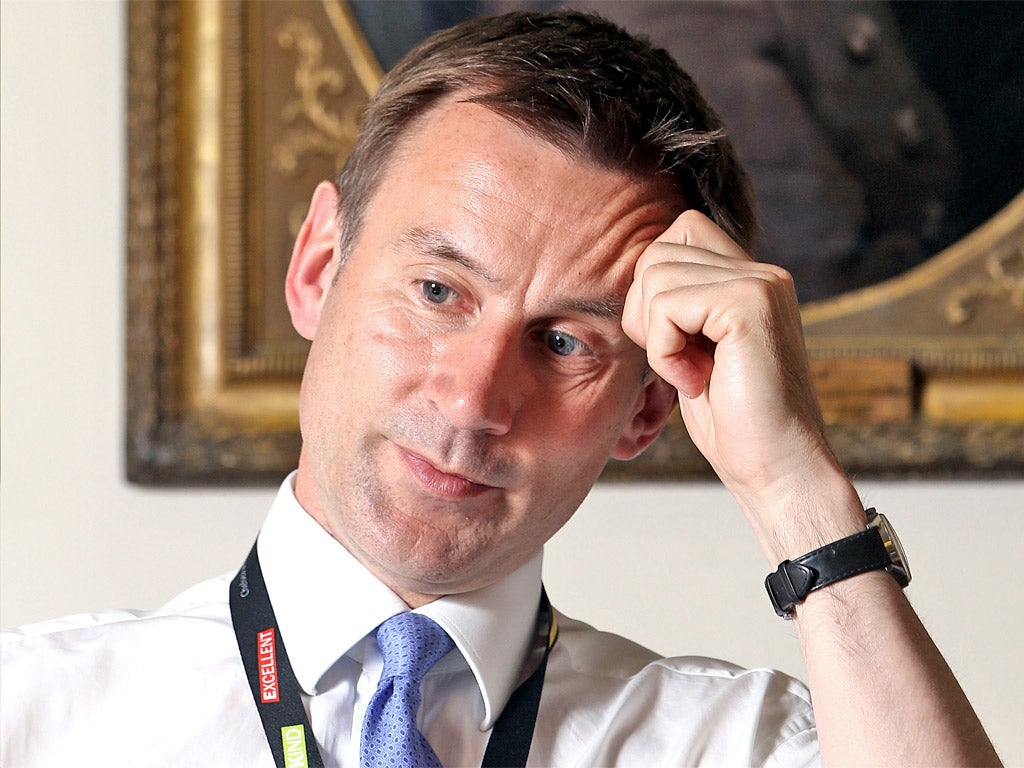Jeremy Hunt criticised for 'misrepresenting' NHS weekend mortality facts
Editor of the BMJ asks Health Secretary to confirm he 'fully understands the issues involved' in pointed letter

Your support helps us to tell the story
From reproductive rights to climate change to Big Tech, The Independent is on the ground when the story is developing. Whether it's investigating the financials of Elon Musk's pro-Trump PAC or producing our latest documentary, 'The A Word', which shines a light on the American women fighting for reproductive rights, we know how important it is to parse out the facts from the messaging.
At such a critical moment in US history, we need reporters on the ground. Your donation allows us to keep sending journalists to speak to both sides of the story.
The Independent is trusted by Americans across the entire political spectrum. And unlike many other quality news outlets, we choose not to lock Americans out of our reporting and analysis with paywalls. We believe quality journalism should be available to everyone, paid for by those who can afford it.
Your support makes all the difference.Jeremy Hunt has been castigated by the editor of Britain’s leading medical journal over alleged “misrepresentation” of the facts on weekend mortality at NHS hospitals.
In a pointed letter to the Health Secretary, Dr Fiona Godlee, editor of the British Medical Journal (BMJ) asks Mr Hunt to confirm he “fully understands the issues involved”.
Mr Hunt has repeatedly asserted that understaffing at hospitals during the weekend is causing 11,000 excess deaths every year. The claim is a key plank of the Government’s argument for what they call a “seven-day NHS”.
It is based on a research paper published in the BMJ last month, which identified that 11,000 more deaths occur within 30 days of admission to hospital on Friday to Monday, than occur after admission Tuesday to Thursday.
While the paper did identify a lack of senior doctors and support services at the weekend as possible factors, it also points out that people coming to hospital at the weekend tend to be sicker. The authors, who include NHS England’s medical director Sir Bruce Keogh, were explicit that it was not possible to determine “the extent to which these excess deaths may be preventable” and said it would be “rash and misleading” to assume they were.
In her letter to Mr Hunt, Dr Godlee states: “Despite the authors’ very clear statements to this effect in the paper and elsewhere, you have repeatedly told MPs and the public via media interviews that these deaths are due to poor staffing at weekends, with a particular emphasis on medical staffing. This clearly implies that you believe these excess deaths are avoidable.
“I ask you to publicly clarify the statements you have made in relation to this article to show that you fully understand the issues involved.”
Mr Hunt has also been challenged on the claim by a group representing more than 3,000 doctors, who last week complained to the Cabinet Office, claiming that Mr Hunt had breached the ministerial code by allegedly giving misleading information to Parliament.
The question of medical staffing at weekends lies at the root of the current dispute between the Government and junior doctors. Mr Hunt has told doctors he wants the new contract, which will increase basic salaries but will cut pay for working evenings and Saturdays, to help “eradicate” the weekend effect.
But fears that the proposals will lead to pay cuts for many and remove safeguards around working hours have led doctors union the British Medical Association (BMA) to ballot members for strike action. It has been announced that balloting would begin on 5th November, running until 18th November.
I ask you to publicly clarify the statements you have made in relation to this article to show that you fully understand the issues involved
Announcing the ballot, Dr Johann Malawana, chair of the BMA’s junior doctor committee, also raised the issue of Mr Hunt’s “rhetoric” on the need for more weekend staffing.
“The health secretary has accused junior doctors of misleading the public over the impact of his changes, yet at the same time he continues to conflate junior doctors’ legitimate concerns and the government’s rhetoric on seven-day services,” Dr Malawana said. “The truth is that the junior doctor contract is in no way a barrier to seven-day services, with the vast majority of junior doctors routinely providing care to patients 24/7.”
The Department of Health has said the plans for reforming junior doctor contracts will be cost neutral, and while Jeremy Hunt has said he does not want to see any junior doctor face a pay cut, he has not been able to guarantee that none will. At Prime Minister’s Questions, David Cameron backed the Health Secretary, saying that plans for junior doctors were not about cutting pay, increasing hours or making savings.
“They are about making sure that the health service works better for doctors and, above all, for patients,” Mr Cameron said. “They are part of delivering the seven-day NHS that should be the objective of every Member of Parliament and everyone in our country.”
Responding to Dr Godlee’s letter to Mr Hunt, health minister Ben Gummer said that debating about “precisely how many of the thousands of deaths are avoidable misses the point”.
“Significant independent clinical evidence shows increased mortality in our hospitals at weekends linked to reduced clinical cover. The BMJ authors themselves acknowledge that...What all doctors want is to provide the best care for their patients, and the public rightly expect the highest standards whichever day of the week they are admitted to hospital – the Government is committed to supporting that.”
Join our commenting forum
Join thought-provoking conversations, follow other Independent readers and see their replies
Comments